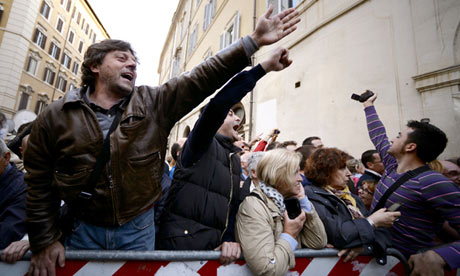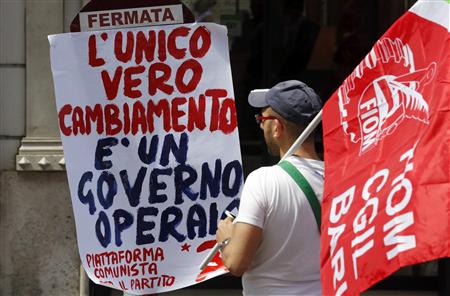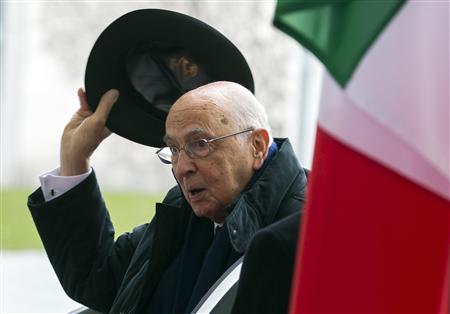ROME (Reuters) - Thousands of people protested in Rome on Saturday against austerity policies and high unemployment, urging new Prime Minister Enrico Letta to focus on creating jobs to help pull the country out of recession.
-------
Jump to what I posted on Feb.27, 2013 ...
http://i800guswho.blogspot.com/2013/02/new-pope-rome-destroyed-prophesy.html
Edit: 4/27... If something is going to happen, it well happen within 2 months of this new government being formed...
ROME (Reuters) - Italian center-left politician Enrico Letta named a coalition government on Saturday, making one of Silvio Berlusconi's closest allies deputy prime minister and ending two months of damaging political stalemate.
Letta has said his priorities would be the economy, unemployment and restoring faith in Italy's discredited political institutions as well as trying to turn Europe away from austerity to focus more on growth and investment.
An inconclusive general election in February left Italy, the euro zone's third-largest economy, without effective government, threatening investor confidence and holding up efforts to end a recession set to become the longest since World War Two.
Letta, the 46-year-old deputy head of the Democratic Party (PD), said he felt "sober satisfaction" after three days of talks with rival parties produced a government that included a record number of women ministers but few political big hitters.
"I hope that this government can get to work quickly in the spirit of fervent cooperation and without any prejudice or conflict," President Giorgio Napolitano said.
The anti-establishment 5-Star Movement has refused to join a government which party leader Beppe Grillo said "bordered on incestuous" given the relationship between Letta and his uncleGianni Letta, Berlusconi's long-time chief of staff.
Angelino Alfano, secretary of Berlusconi's People of Freedom (PDL) party, will be deputy prime minister and interior minister, giving the center-right a strong voice.
But otherwise the big ministries were dominated by lower profile politicians or technocrats, which could limit their power to pass unpopular measures and leave a powerful backstage role for Berlusconi, who will not be joining the government.
The cabinet, which Letta said would contain a record number of women, will be sworn in at 05.30 EST on Sunday before a parliamentary vote of confidence, expected on Monday.
Napolitano asked Letta, a career politician on the right of the PD, to try to form a government after a dramatic week in which party leader Pier Luigi Bersani was forced out by a factional mutiny....
------------------------------
Napolitano elected for second term as Italy president
By Gavin Jones and Naomi O'Leary | Reuters –
By Gavin Jones and Naomi O'Leary
ROME (Reuters) - The Italian parliament on Saturday re-elected 87-year-old President Giorgio Napolitano to serve a second term in an attempt to resolve the political stalemate left by February's inconclusive election.
As most of parliament cheered his re-election, demonstrators protested outside. By evening the crowd had swelled as thousands of people vented anger at an outcome that was widely seen as perpetuating the grip on the country of a discredited political class and favoring centre-right leader Silvio Berlusconi.
The leader of the anti-establishment 5-Star Movement Beppe Grillo called on "millions" of Italians to protest against Napolitano's re-election which he called a "coup d'etat."
Napolitano was elected with the votes of 738 of the 1,007 parliamentarians and regional representatives in a sixth round of voting after they had failed to find a mutually acceptable candidate in the previous attempts.
He is expected to try to push for the formation of a broad coalition government in a round of consultations with party chiefs starting next week.
In brief televised comments from his presidential palace, he said the coming weeks would be crucial for the country and called on all sides to "fulfill their duties."
In almost two months, Napolitano, one of the world's oldest heads of state, has failed to broker a solution to the gridlock that emerged from the February election which left no group with enough seats in parliament to form a government.
A broad coalition has so far been rejected by the centre-left, which won most seats and refused to join forces with Berlusconi's centre-right.
However Napolitano now has the power to dissolve parliament, which he did not have in the final months of his current term. Most on the centre-left, which has been torn apart by internal divisions since the February vote, fear new elections and so may be more willing to come to terms with Berlusconi.
The 76 year-old media magnate, who was forced from office at the height of a debt crisis in 2011 and was still being written off until shortly before the election, now leads in the polls.
"Berlusconi is the real winner because there will be a broad coalition that will be a disaster for the country," said Nichi Vendola, head of the small Left and Freedom party which looks ready to quit the centre-left alliance that fought the election.
GRILLO MAKES "CALL TO ITALIANS"
Tensions in the country are running high. Ordinary Italians are struggling with recession, falling living standards and rising unemployment and centre-left voters in particular have looked on aghast at developments since the election.
On his blog, Grillo said the traditional parties he blames for Italy's economic decline and corruption have already agreed to form a broad coalition to preserve the status quo.
"There are decisive moments in the history of a nation," he wrote in a post entitled 'call to Italians' in which he said he would travel personally to parliament that evening.
Later, as scores of police in riot gear stood outside the parliament building and rival protesters, many of whom appeared not to be from 5-Star, argued angrily, Grillo said he could not make it in time to Rome from the north of Italy.
Grillo's appeal to protest was condemned by mainstream politicians, some of whom said his language was reminiscent of wartime dictator Benito Mussolini's "march on Rome" which marked his rise to power in 1922.
5-Star rode a huge protest vote to become one of three main forces in parliament, driven by frustration at economic hardship and the perceived corruption of politics.
The main centre-left Democratic Party (PD) is in chaos after scores of rebels took advantage of secret ballots to sabotage the party's official candidates in previous presidential votes.
PD leader Bersani announced late on Friday that he would quit after the new president was elected, leaving the largest force in parliament rudderless and making prospects for broader political stability looking even weaker.
On Saturday Bersani's deputy, Enrico Letta, announced that the whole of the PD executive committee had resigned.
The transformation in the fortunes of Bersani, who three months ago seemed the likely next prime minister, underlined uncertainty over how a deeply-divided political class can implement much-needed reforms to tackle an economy that has stagnated for the last 20 years.
There will now be a leadership battle in the PD, founded to unite a range of smaller leftist and centrist parties in 2007.
Bersani's departure could make way for his arch-rival the 38-year old mayor of Florence Matteo Renzi, who has wide public support but is viewed with suspicion by the old PD hierarchy.
"Now the PD has the chance to really change, without any fear, we'll try," Renzi said in a tweet on Saturday.
Napolitano has been formally elected for a full seven-year term but most commentators believe that once the present political crisis is resolved, he will probably resign within a year. No president has ever been elected for a second term in a role which is, in normal times, largely ceremonial.
..............................................................
Giorgio Napolitano re-elected as Italy's president, prompting relief and protests
87-year-old's re-election draws standing ovation by most MPs, but protesters say result is depressing sign of political stagnation

M5S supporters gather outside the Italian parliament before the re-election Giorgio Napolitano as Italy's president. Photograph: Filippo Monteforte/AFP/Getty Images
Giorgio Napolitano, an 87-year-old political veteran who had been planning to embark on a well-earned retirement within weeks, has become the first Italian president to be re-elected to serve a second term, after squabbling and discredited party leaders who had failed to agree on his successor begged him to stay on "in the higher interests of the country".
In an unprecedented move which observers said raised Italy's chances of seeing the formation a broad coalition government, the widely-respected former Communist was re-elected with cross-party backing that included Silvio Berlusconi's centre-right Freedom People (PDL) party and the centre-left Democratic party (PD).
Napolitano received 738 votes, easily surpassing the simple majority needed in the sixth round of an election that since Thursday had been dogged by vicious infighting in the PD and had compounded the political stalemate in which Italy has been stuck for weeks.
The result was greeted with relief and a standing ovation by most MPs in the chamber of deputies. But outside hundreds of protesters damned what they saw as a depressing sign of Italy's political stagnation and back-room deal-making.
In a furious denunciation on his blog, Beppe Grillo, the former comedian and founder of the anti-establishment Five Star Movement (M5S), declared Napolitano's re-election a "coup d'état" that had been engineered by political heavyweights desperate to "prevent change". Announcing he was on his way to Rome in his camper van to protest the move outside the parliament, he called for millions to join him in a "mobilisation of the people".
The M5S had backed the respected academic Stefano Rodotá for head of state. He received 217 votes. No other candidate attracted any significant support. Romano Prodi, the former prime minister whose candidacy was humiliatingly rebuffed on Friday, received two votes.
Napolitano's decision to stand again for the presidency came after political leaders including Berlusconi and Mario Monti, Itay's caretaker technocratic prime minister, visited him one by one at the Quirinale palace on Saturday morning to plead with him to stay on.
Until then, Napolitano, who will be 88 in June and would be nearly 95 by the end of a second seven-year term, had dismissed such appeals, citing his advancing years.
But such is the respect he commands in an otherwise deeply polarised and fractured political landscape that in the end it was to Re Giorgio (King George) that the party leaders, desperate to bring closure to an electoral saga that had covered none of them in glory, turned.
"I believe I must offer my availability as requested," he said in a brief statement just before MPs were due to begin voting in the sixth ballot, adding that he could not "shun my responsibility towards the nation". Pointedly, he added that he trusted that his decision would be met with "a similar collective assumption of responsibility" by the political leaders.
The presidency is largely a ceremonial role but is crucial in periods of instability as only the head of state has the power to dissolve parliament, call elections and name a new prime minister.
In the eight weeks since February's inconclusive parliamentary elections, Napolitano has made no secret of his desire to see a government of some kind formed rather than sending Italians back to the polls. Pier Luigi Bersani, the centre-left PD leader to whom he had given an exploratory mandate to form a government, had refused to enter into a grand coalition arrangement with Berlusconi's centre-right bloc, and the M5S had refused to enter into anything with him.
On Friday night, though, a beleaguered Bersani said he would step down as PD leader as soon as a new president was chosen, thus potentially opening the path to fresh negotiations which Napolitano is expected to begin immediately. Some observers speculated that Giuliano Amato, a two-time prime minister who is himself now 74, could serve as prime minister in a new government with a limited lifetime and reformist remit.



No comments:
Post a Comment